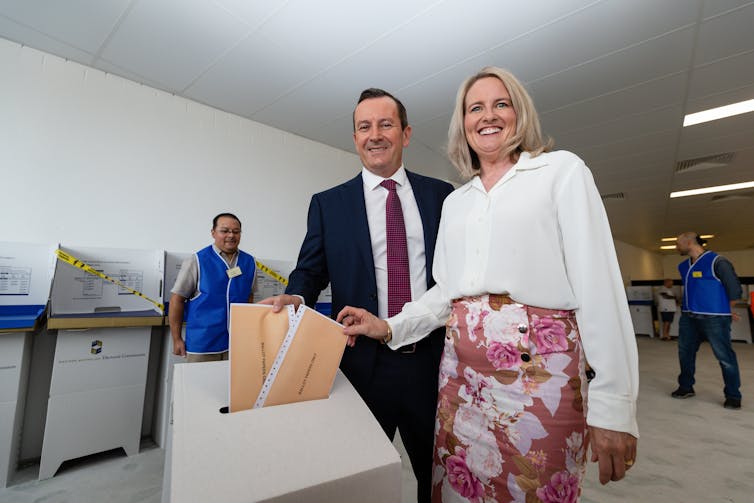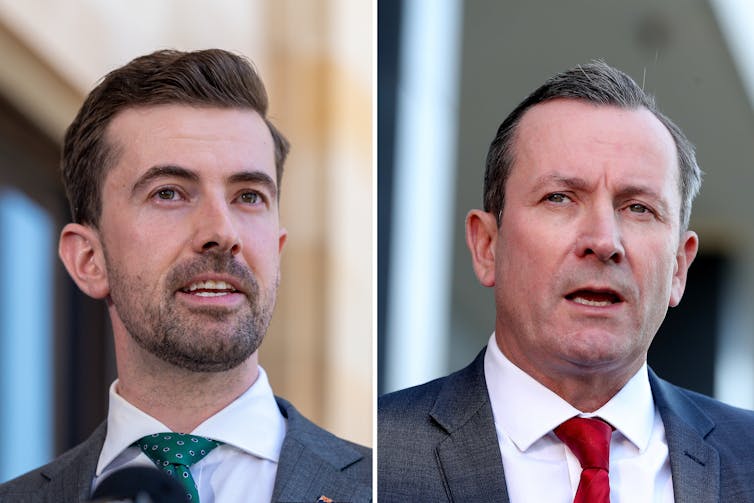Meet Mark McGowan: the WA leader with a staggering 88% personal approval rating
- Written by John Phillimore, Executive Director, John Curtin Institute of Public Policy, Curtin University
Last March, Western Australian Premier Mark McGowan donned an AC/DC t-shirt to pay tribute to Bon Scott, the late lead singer of the legendary band.
He joined some 150,000 fans who gathered along Perth’s Canning Highway to hear bands covering “Highway to Hell” and other AC/DC classics.
In the 12 months since, the world has certainly been to hell and back. Politically, however, for McGowan the year may feel more like a stairway to heaven. With the state election due on March 13, polls suggest he will win easily, and even increase Labor’s already record majority. His personal approval rating sits at a staggering 88%.
Read more: Whopping lead for Labor ahead of WA election, but federal Newspoll deadlocked at 50-50
But polling is one thing, celebrity status is another. And McGowan’s popularity is bordering on rock star status in some quarters.
In recent weeks, a voter has willingly tattooed a likeness of McGowan’s face on their body, a local comedian has written a song of devotion to him, a wedding party hauled him on stage to speak to 300 cheering guests, and a video of the Premier’s dance moves at the Perth Fringe has gone viral on TikTok.
Who is McGowan, and why is the 53-year-old enjoying such a huge poll lead? And what lies in store on the other side of the election?
From the navy to state politics
Originally from regional New South Wales, McGowan joined the navy as a lawyer. In 1991 he was posted to HMAS Stirling near Rockingham, 50 kilometres south of Perth. In 1995, he won a bravery commendation for rescuing a man from a burning car.
 WA Premier Mark McGowan and his wife Sarah cast their votes last week at a pre-polling booth.
Richard Wainwright/ AAP
WA Premier Mark McGowan and his wife Sarah cast their votes last week at a pre-polling booth.
Richard Wainwright/ AAP
He has been Rockingham’s local MP since 1996 — the second longest-serving MP in state parliament. He entered Geoff Gallop’s cabinet in 2005 and is seen to have chalked up solid achievements in environment, education and perhaps most notably in loosening regulations to encourage small bars.
With Labor in opposition, he took over as leader in 2012, only to see his party go backwards at the 2013 election. He then resisted a far-fetched leadership challenge from former federal minister Stephen Smith before finally winning a record victory in 2017 against Colin Barnett and the Liberal Party.
The WA factor
Most Australian political leaders saw their popularity grow during COVID-19, with trust in governments rising as Australia performed well, minimising health and economic impacts.
But WA provides particularly fertile ground for a leader. The state has always had a strongly independent streak, distant from “the eastern states”. It also firmly believes its mining and gas resources are the basis for Australia’s economic prosperity and that the proceeds have not — until a recent GST deal — flowed back to the state.
McGowan played this situation adroitly, declaring in early April 2020 that WA would become an “island within an island” by closing its borders. He took a firm line on international cruise ships. His public image was ubiquitous with daily media briefings, and softened by his spontaneous response to a media query about buying a kebab, of all things, which also went viral.
He successfully fended off a High Court challenge to WA’s hard border from businessman Clive Palmer as well as the mining magnate’s claim the state owes him A$30 billion.
Meanwhile, McGowan worked with the mining industry to keep production going by transferring interstate fly-in fly-out workers to WA. He was rewarded as iron ore prices skyrocketed and the state’s finances grew. Regional tourism has revived and the state’s economy recovered more quickly than interstate counterparts.
Since mid-2020 daily life in WA has been largely normal again, despite a blip in January when a short lockdown was imposed, due to a hotel quarantine breach.
Of course, it’s not all bouquets. The Western Australian Council of Social Service has called on the McGowan government to do more to address child poverty, improve housing affordability and reduce the over-representation of Aboriginal young people in out-of-home care and juvenile justice. Critics have described his government’s efforts to hold the fossil fuel industry accountable for its greenhouse gas emissions as “limp”. Plenty outside the state have condemned some of the WA government’s snap decisions on COVID border closures.
Despite all that, McGowan’s government remains enormously popular where it counts: among WA voters.
What’s next?
Assuming he wins — and wins big — on 13 March, what are the challenges and opportunities facing McGowan and his government?
Economically, WA appears in a strong position, and Labor’s election campaign has focused on more job creation. But the state is always subject to international commodity cycles, while tensions in Australia’s relationship with China — the main customer of WA iron ore — add a new element of risk.
 Liberal leader Zak Kirkup has already conceded he cannot win the election.
Richard Wainwright/ AAP
Liberal leader Zak Kirkup has already conceded he cannot win the election.
Richard Wainwright/ AAP
Socially, dealing with homelessness and rising house prices and rents will be on the agenda, after several years of relative stagnation in the property market.
Politically, despite Liberal warnings of Labor gaining “total control” of parliament, it is highly unlikely McGowan can secure an outright majority in the upper house, given the high levels of rural malapportionment. But there is a chance that Labor and the Greens combined could win an upper house majority for the first time.
This could put pressure around issues such as carbon emission reductions, where WA Labor has generally been happy to let Canberra take the lead. More prosaically, the prospect of a big win means McGowan will have to find ways of managing a large backbench that will inevitably include restive MPs with thwarted cabinet ambitions.
Read more: The Liberals face electoral wipeout in WA, but have 3 good reasons to keep campaigning
However, the prime concern will be to avoid complacency and overreach, especially if the opposition is weak. WA governments tend to win two terms. A big win for McGowan may make a third term seem inevitable, but upsets like the Liberal National Party’s 2015 loss in Queensland show elections can’t be taken for granted.
But for now, the WA Liberals, under leader Zak Kirkup, appear to be on a road to nowhere. For Mark McGowan, it’s been a long way to the top. He is in no hurry to come down.
Authors: John Phillimore, Executive Director, John Curtin Institute of Public Policy, Curtin University





